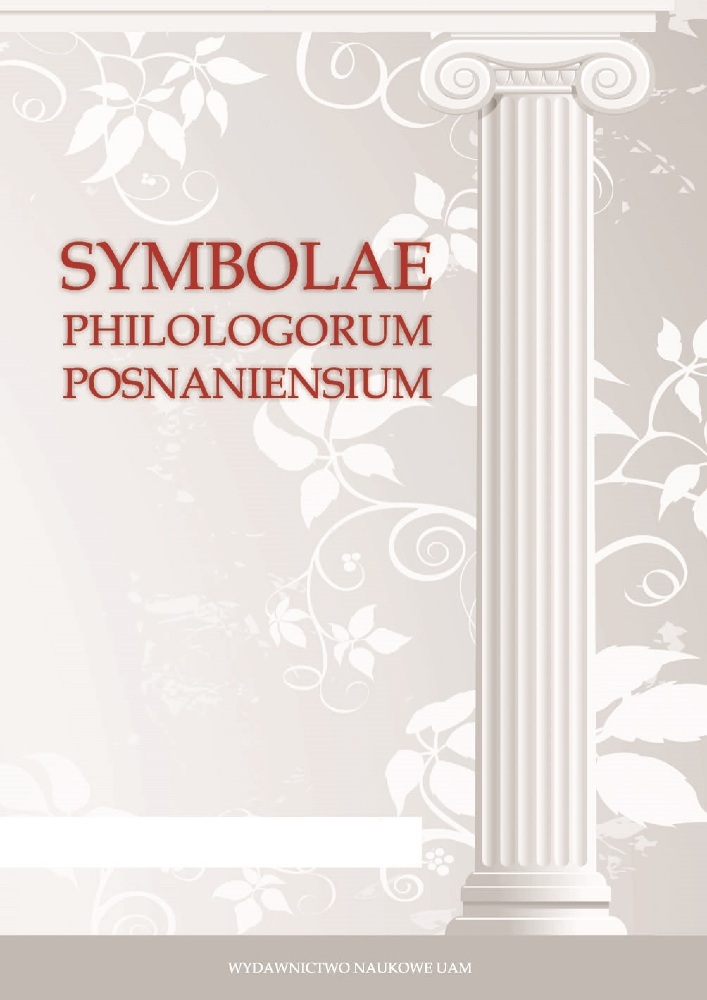Abstract
The authors of antique literary texts referring to the Roman Republic gave their attention to women inconsiderably. They were convinced, that woman’ space , according to the ancestors’rules, was a house (domus Romana). Despite of this opinion there are some references to old women in antique testimonia, both Greek and Latin. We can find there few mentions about Veturia, mother of Coriolanus, Cornelia, mother of Cracchi, Terentia, the wife of Marcus Tullius Cicero and Caerellia, the friend of orator. These information allow us to draw an optimistic conclusion regarding to the old woman’ status in Republican Rome. Indeed, we should declare that all of them were born in the upper class (nobilitas) and their familie were wealthy. These four women live during their old age independently, without the care of their male relatives. Probably all of them were widows. Veturia and Cornelia lost sons involved in politics of Rome. Terentia supplied her son Marcus in money. Although their Male relatives were in serious troubles, women did not bear any consequences because of it. They still were living in their splendid house, run rich estate and spent leisure hours Reading books from private libraries and meeting friends.They were persons of good reputation. Most important of all, Veturia’s behaviour and Cornelia’s way of life led to build a parenetic legend about these antique heroins.References
Angel 1972: J.L. Angel, Eulogy and Population in the Eastern Mediterranean, „World Archeology” 4 (1972), 88–105, tabl. 28.
Bauman 1992: R. Bauman, Women and Politics in Ancient Rome, London–New York 1992.
Bieżuńska-Małowist 1993: I. Bieżuńska-Małowist, Kobiety antyku. Talenty, ambicje, namiętności, Warszawa 1993.
Cicero 1970: Marcus T. Cicero, Scripta quae manserunt, fasc. 4: Brutus, ed. K. Kumaniecki, Leipzig 1970.
Cyceron 2010: Marek T. Cyceron, O mówcy, przeł., wstępem i komentarzem opatrzył B. Awianowicz, Kęty 2010.
Dion 2008: Kasjusz Dion, Historia rzymska, wstępem poprzedził, przeł. i koment. I. Ptaszek, Kraków 2008.
Hemelrijk 1999: E.A. Hemelrijk, Matrona docta. Educated Women in the Roman Elite from Cornelia to Julia Domna, London–New York 1999.
Hopkins 1966: K. Hopkins, On the Probably Age Structure of the Roman Population, „Population studies” 20 (1966), 245–264.
Kumaniecki 1977: K. Kumaniecki, Literatura rzymska. Okres cyceroński, Warszawa 1977.
Lightman 2008: M. and B. Lightman, A to Z Ancient Greek and Roman Women, Revised edtion, New York 2008.
Plutarch, Lives with an English Translation by Bernadotte Perrin, vol. IV, Cambridge 1959.
Pomeroy 1994: S. Pomeroy, Goddesses, Whores, Wives and Slaves. Women in "Classical Antiquity", London 1994, 151.
Marcus F. Quintilianus, Institutionis oratoriae libri XII , ed. L. Rademacher, Leipzig 1965.
Skinner 2011: M.B. Skinner, Clodia Metelli. The Tribune’s Sister, Oxford 2011.
Syme 1964: R. Syme, Sallust, Berkeley 1964.
Treggiari 2007: S. Treggiari, Terentia, Tulia and Publilia. The nomen of Cicero family, New York 2007.
License
